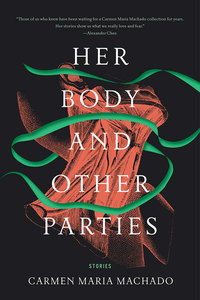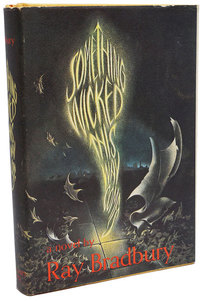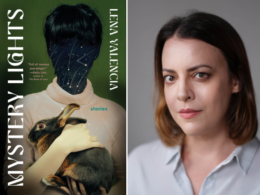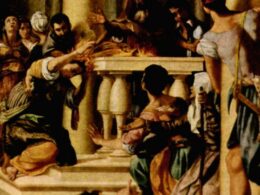Our latest guest post by a contemporary writer comes from Carmen Maria Machado, whose debut collection Her Body and Other Parties: Stories was just published by Graywolf Press and has been named a Finalist for the 2017 National Book Award for Fiction.

Comprised of eight stories that elide any distinction between genre and more traditional realism, Her Body and Other Parties explores contemporary women’s lives and desires in scenarios that can be graphic and unsettling as well as comic. The book has already won the notice of some prominent writers: Jeff VanderMeer calls the stories “raw and devastating but also exquisitely plotted and full of delight,” while Roxane Gay hails Machado’s “voracious imagination and extraordinary voice.”
Below, Machado pays tribute to some of the writers who have inspired her work.
Shirley Jackson, The Haunting of Hill House. Shirley Jackson is currently having a very well-deserved moment, and I’m here for it. Even if she had only written The Haunting of Hill House—one of the scariest books that both Stephen King and I have ever read—she would still deserve her place in the American canon. But she wrote so much more than that: five other brilliant novels, a gorgeous and chilling assortment of short stories, and witty, acerbic nonfiction about midcentury motherhood. But I always come back to Hill House, a queer and terrifying haunted house story that feels like a nightmare you can’t wake up from.

Ray Bradbury, Something Wicked This Way Comes. When I was a kid, there was a particular Ray Bradbury collection at our local library—The Stories of Ray Bradbury, wide as a brick and with a Day-Glo cover—that I checked out with unflagging regularity. I recall two distinct feelings that came with each reading: first, that I was developing a head-over-heels love of short stories, which did not emerge organically in my life in any other way, and second, that I was flabbergasted that there were so many of them, and they were so consistently exciting and terrifying.
Bradbury was brilliant at evoking mood, skirting the edge of the uncanny, and undermining everything that made me feel safe. But nothing struck fear into my heart as truly as his sinister coming-of-age carnival novel, Something Wicked This Way Comes, which I first read in middle school on a hot summer afternoon as black thunderheads filled the sky outside my window.
Nicholson Baker, Mezzanine. I sometimes wonder how my life might have been different if I’d read Nicholson Baker’s fiction earlier in my life. His playfulness, his humor, his generosity, and his intelligence infuse every book with a tender illumination that I find so rarely elsewhere. Everything he touches—from milk cartons to explicit sexual encounters—becomes refreshed under his gaze and his luminous, achingly specific prose, and you’d have to be pretty stone-hearted to come away from his work with anything but a new sensitivity to and appreciation for the strange and haunting beauty of the world. Mezzanine is for every person who has mentally drifted away from their menial job on a raft of private observation and memory, and found solace there.
Kelly Link, Stranger Things Happen and Magic for Beginners. In the last few years, Kelly Link has received long-overdue literary attention; her newest book, Get in Trouble, was a finalist for the Pulitzer in 2016. But it was Kelly’s first two collections, Stranger Things Happen and Magic for Beginners, that came to me at a very critical crossroads: I’d recently started grad school and was struggling to find my identity as a writer. Her ecstatic, gorgeous, uncategorizable books, which I devoured one after the other, reminded me that rules were for chumps, that short stories were a glorious and exciting form, and that genre was a tool meant to serve the writer, and not the other way around.
Louis Sachar, Sideways Stories from Wayside School and Wayside School Is Falling Down. I’m not entirely certain that there’s a writer for young people as singularly brilliant as Louis Sachar; his work did so much for me as a young reader and writer that the debt feels unrepayable. These books break every rule: they’re episodic, metafictional, horrifying, and just plain goofy. The surreal logic of the non-existent nineteenth floor, the horror of the evil substitute teacher who steals children’s voices, the child who is just a rat in a lot of clothes, the author-insert in the form of a beleaguered janitor—it’s so rare to feel the fun the author is having emanating off the page so acutely, and all while meditating on so dark a theme: that children need to be self-sufficient, as most adults will fail them over and over again. Later in my life, the Series of Unfortunate Events by Lemony Snicket would ring a similar bell, but Louis Sachar was the first.
Lois Duncan, Gallows Hill. When Lois Duncan died last year, I found myself revisiting her work, which had been so important to me as a teenager. Of everything she wrote, it was the book of which there was a very silly film adaptation—I Know What You Did Last Summer—that was her most well-known. But Duncan was the master of the surreal, supernatural, and psychological thriller, and her prolific oeuvre defied easy categorization. She gave her young female characters agency and voices and did not spare them the horrors of the world. Had she not experienced a devastating tragedy—her beloved youngest daughter’s murder in 1989—her streak of menacing, brilliant fiction might have continued until very recently. As it was, the constant reissuing of her books kept them alive for new generations of readers, including my own. Here, I choose _Gallows Hill not because the others aren’t just as great; rather, it is the last of its kind she wrote, and the first of hers I read. It scared me so badly, I went back for more.
Philadelphia resident Carmen Maria Machado has been published in Best American Science Fiction & Fantasy, Granta, Guernica, Tin House, The New Yorker, and the Los Angeles Review of Books, among many other outlets. A nominee for both a Nebula Award and Shirley Jackson Award, she has won residencies and fellowships from the Elizabeth George Foundation and Yaddo. Machado is currently Artist in Residence at the University of Pennsylvania and is working on an experimental memoir, House in Indiana.



